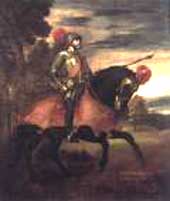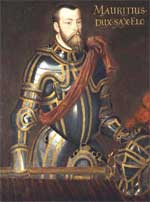Charles V: Holy Roman Emperor
Charles V defeated the candidacy of Francis I of France and was elected Emperor of the Holy Roman Empire on 28 June 1519. As an Emperor, Charles V made sustained efforts to curb the spread of the Reformation.

Tiziano Vecellio
Charles V at Mühlberg, 1548
On the 25th of May 1521, at the Diet of Worms, Emperor Charles V issued the Edict of Worms, banning Luther's writings, forbidding anyone to defend and sustain him, and labelling Luther as an enemy of the state. However, the Reform spread rapidly in Germany and Austria. The doctrines of Luther were preached at Vienna by Paul von Spretten, (Speratus). Archduke Ferdinand, Emperor's brother, took severe measures to stop the Reformation movement in Austria. Speratus was banished, and his successor, Tauler, condemned to the stake. Hubmaier of Waldshut was also burnt. Still, Lutheranism rapidly progressed, as the preachers were patronized and protected by the nobility, upon whom Ferdinand could not retaliate.
A Diet met again at Speyer in 1529, and resolved to carry out the Edict of Worms, while Charles declared that he will wipe out the Lutherans. Nineteen of the states of the empire, lead by Saxony and Hesse , protested against mandatory measures being taken regarding religion (April 19,1529). This protest gave the reformers the name of protestants. The emperor again summoned a Diet to meet at Augsburg in 1530. On the 25th of June the Protestants presented their Confession of Faith, drawn up by Melanchthon. This was the famous Augsburg Confession (Confessio Augustana), which explained exactly where Reformation coincided with the Catholic faith, and where it deviated from it. The emperor issued a counter-declaration (confutatio), which was presented to the Diet August 3 and commanded the Protestants to return to the Catholic Church. The Catholic majority decided that all religious innovations should be suppressed by force, and Charles dismissed the Diet with threats of severe measures.
The chiefs of the Protestant party assembled in December at Schmalkald, in Thuringia, and on March 29, 1531, they formed "The Schmalkaldic League," which was to last six years, and was joined by a large number of princes and of cities. The emperor was again called out of Germany by the affairs of Spain; but first he made sure his brother Ferdinand was elected "King of the Romans," by the Catholic electors at Cologne, January 5, 1531.
The danger of an Ottoman invasion made Emperor Charles V to look for compromise through the mediation of Frederick, Elector of the Palatinate, and the Religious Peace of Nuremberg was signed on July 23, 1532. Both parties pledged themselves to await the decision of a general council of the Church regarding their differences of faith. For more than ten years, the Reform enjoyed a steady period of growth. The Council of Trent, opened by Pope Paul III in 1545, again issued condemnations of the Protestant heretics, and the Emperor convoked a diet for the next year at Regensburg.

Lucas Cranach the Younger
Maurice of Saxony
At the Imperial Diet of Regensburg in 1546, Ferdinand, who represented the Emperor, insisted that both parties should submit their differences to the General Council of Trent, and abide by its decision. The Emperor tried every method to persuade the Protestants to recognise the council, meanwhile secretly assuring the pope, in the event of war, of his intention to extirpate the Lutheran heresy.
Angered by Charles V duplicity, in August, 1546, the princes of Saxony and Hesse united their forces at Donauwoerth with those of Sebastian Schertlin and Hans von Heidek. Charles was in a difficult position, as their superiority in numbers was overwhelming. His Imperial troops were slowly coming in isolated detachments, from Italy and the Netherlands, and could be easily defeated. Charles was lucky, as Schertlin's opinion to attack them immediately was disregarded. The Emperor himself designates the failure of the Smalkaldians to attack him in Regensburg as one of their fatal mistakes. Charles escaped to Ingolstadt, which was much better fortified.
The disagreements among the rebels rendered their superior numbers useless, and after vainly bombarding Ingolstadt, they withdrew.
After imperial reinforcements arrived, the two armies met north of Ulm. John Frederick, and Philip of Hesse withdrew, while one by one the towns and minor princes submitted to the Emperor. The terms of surrender for the members of the league were hard, especially high fines. In the meantime, John Frederick occupied Magdeburg and Halle, and besieged Leipzig. But on a misty Sunday, he was defeated at the Battle of Mühlberg, and captured.
Regarding Philip of Hesse, Charles demanded nothing short of unconditional surrender. Philip was arrested at Halle and kept in close confinement under severe surveillance .
The Council of Trent, after a short sitting, separated. The Emperor's urgent requests to be called again were disregarded by the pope. Charles V therefore decided to draw up "The Augsburg Interim" of 1548, a system of religious doctrine and practice, to be carried out until a free general council should meet. He secured the approval of it by the Diet at Augsburg. The Protestants were dissatisfied with the Interim, while the pope and the zealous Catholics did not approve any concession . The plan was enforced with great severity. In Northern Germany, Bremen and Magdeburg defended themselves by arms, and the latter city became a place of refuge for all who were persecuted for the Protestant faith. The Emperor laid the ban on the city, and charged Maurice of Saxony and Joachim II with his execution.
Charles abandoned his plan for the reconciliation of the Protestants without the interference of the pope. Paul III. was succeeded by Julius III., who, bribed by the emperor's promise of bringing the Protestants to him, opened, in 1551, the Council at Trent, where the Protestants were compelled to send their deputies. The elector of Brandenburg most deeply humbled himself, by promising, as a good son of the church, to obey every decree of the council.
The Protestants now found their worst foe among them, as Maurice of Saxony secretly assembled an immense force, and entered into alliance with Henry II of France. Together with Albert von Culmbach, Maurice raised the standard of revolt, and published a manifesto, in which they accused Charles for bringing too many foreigners, Spanish and Italians, in Germany.
In 1552,Maurice, after granting peace to Magdeburg, marched, with William of Hesse, and Albert the Wild of Culmbach, upon Innsbruck, where the emperor lay sick. A mutiny in the electoral army saved Charles V, giving him time to escape across the mountains to Villach, in Carinthia. Charles V was without troops, Maurice was in full pursuit, and the Lutherans were full of hope.
On August 2nd, 1552, the Treaty of Passau was concluded, granting religious liberty to Protestants. The princes, John Frederick and Philip, were free. In turn, Maurice promised to defend the Empire against the French and the Turks. Charles V, meanwhile, marched against the French, and deposed the corporative governments reinstated by Maurice in Augsburg, Ulm, Esslingen. Metz, defended by the Duke de Guise, resisted the siege for months, and Charles was forced to retreat.
The aged Charles V looked for peace, and, after the Second Margrave War, and the death of Maurice, the religious peace of Augsburg was concluded by the diet held in that city in 1555.